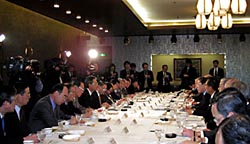Spring Struggle Discussions at Labor-Mgt. Summit
(24 January 2003)
 |
| Photo: Debating over the 2003 Spring Struggle. |
President Sasamori offered his views on the Spring Struggle saying, "the idea stated in Keidanren's Committee on Management and Labor Policy Report that pay raises are out of the question is unilateral. [Raises] should be decided on business performance." Touching on the matter of employment diversification he said, "part-time workers, dispatched workers and contracted employees have become merely a cheap and easy labor force." He said, "The gap between them and regular employees has been widening," and called for equal treatment from the viewpoint of Work Sharing. Asking for proof of the effectiveness of last year's government-labor-management agreement, he called for all-out activities because "there are no barriers between labor and management."
Nippon-Keidanren President Okuda forecasted the prospects for the economy saying, "business results for the fiscal year ending in March will return to balanced reductions. Some expect progress in the latter half but that will depend on developments in the Iraqi, North Korea, and US economic situations after March, so [economy prospect] much still remains to be seen." Speaking resolvedly he stated, "Personally, in times like this that I would hope aggressive action be taken all the more." He explained that debate over whether or not to raise the consumption tax rate is intended as 'reform' and that "it will be a breakthrough change in Japanese lifestyles."
After speeches from both Presidents, RENGO General Secretary Kusano explained the contents of RENGO's White Paper and Keidanren Senior Managing Director Yano explained the contents of Keidanren's Management and Labor Policy Report.
Afterwards, opinions were exchanged and RENGO appealed for "clear signs of maintaining employment." Correspondingly, Nippon-Keidanren also called for a realization of management responsibility saying, "international competition has entered the country from overseas to the extent that it is now pandemonium. We cannot promise that we will be able to guarantee maintained employment. There are things that we cannot express in words." Continuing, they raised issues "Japan's issue is international competitiveness. Japan abruptly fell to 30th among 49 nations. We need to review national mechanisms and work methods from the viewpoint of international competition."
RENGO raised such wage-related issues as "transparent, fair, convincing personnel/wage systems," the "real situation of gaps between major and small to mid-sized companies," and the "abolition of minimum wages by industries." As for "wage cut reports," Keidanren stressed that they "have no intention of issuing a uniform wage-cut directive." On employment diversification, RENGO pointed out the turbulent workplaces such as "real conditions of employer social insurance contributions for part-time workers" and the "7-5-3 phenomenon.*" [*7-5-3 Phenomenon: Turnover rates for new graduates within three years of employment. 70% are junior high graduates, 50% high school graduates, and 30% college graduates.]
Keidanren spoke of the necessity to "nurture corporate loyalty among workers in companies" and to "organize part-time workers." Opinions on bad loan disposal and how to overcome deflation called for policy changes: "the negative impact of deflation is so severe that we will have no choices but to handle issues like wages, treatment, and pensions."
Finally, President Okuda asked for "enlightenment so that both Japanese citizens and the government will compare and study their own 'household accounts' with other nations of the world to improve things for the better." President Sasamori said, "let's create new labor-management relations at the Spring Struggle earnestly speaking our minds." He also said that, "overcoming the deflationary economy is a burning question. If the government's policies are inappropriate, let labor and management propose other collaborative policies." Sasamori closed the meeting after further appealing to "let labor and management play roles in creating future visions that dissolve fears over jobs and the future."